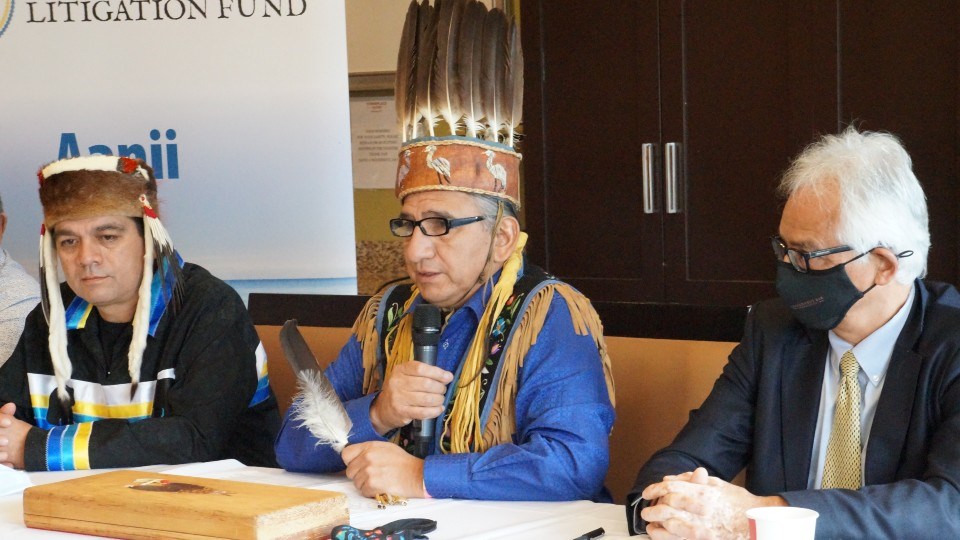Ontario has filed an appeal with the Supreme Court of Canada over the Robinson-Huron Treaty annuities case after decisions by the Ontario Superior Court and the Ontario Court of Appeal ruled in favour of treaty signatories.
The Ministry of the Attorney General confirmed that it delivered the application Jan. 5, which seeks leave to appeal the Nov. 5 Ontario Court of Appeal decision that ruled in favour of the 21 First Nations within Robinson-Huron Treaty territory.
"The Court of Appeal decided a number of important legal questions and Ontario is seeking to have the Supreme Court of Canada provide clarification on key issues of treaty interpretation and obligations," reads a statement issued to SooToday by the ministry Thursday. "Further details of Ontario’s position on the appeal will be available when the factum is filed with the Supreme Court of Canada, if leave to appeal is granted.
"As this matter is before the courts it would be inappropriate to comment further."
Robinson-Huron chiefs expressed disappointment with the Ontario government's decision while speaking with SooToday Thursday.
“We’re definitely disappointed because of the fact that we’ve gone through a number of court hearings, specifically in regards to the annuities case of the Robinson-Huron Treaty, and the court has sided with the First Nations in every instance,” said Wiikwemkoong Unceded Territory Ogimaa (Chief) Duke Peltier. “We don’t know how many times the provincial government needs to be told that they have a duty and an obligation to negotiate this grievance in good faith with the First Nation treaty partners.”
The Ontario Superior Court ruled in 2018 that the federal and provincial governments - known collectively as the Crown - both have an obligation to increase annuities when economic circumstances warrant, after the 21 First Nations in Robinson-Huron Treaty territory took legal action against Canada and Ontario in 2014.
The annual treaty payment, which sees each of the roughly 30,000 beneficiaries of the 1850 Robinson-Huron Treaty entitled to receive $4 annually, hasn’t increased since 1874.
Prior to the 1874 increase, treaty beneficiaries received an annual payment that worked to about $1.60 per person.
Canada chose not to appeal the Stage 1 and Stage 2 decisions in the Robinson-Huron Treaty annuities case, instead creating a mandate process allowing for negotiation and settlement of treaty annuities cases, along with the requirement that Ontario be party to the negotiation and settlement process.
Ontario’s appeal of the Stage 2 decision was struck down. Meanwhile, its appeal of the Stage 1 decision, according to Batchewana First Nation Chief Dean Sayers, wasn’t absolutely struck down, but affirmed a majority of the trial decisions that the Ontario government had been appealing.
“For the most part, what I hear from Ontario citizens is that they are honourable, and they want their government to act honourably and pay the bill,” said Sayers, speaking with SooToday Thursday. “Anybody that has any type of a mandate to provide thought around the legal obligation is telling Ontario, pay the bill, get to the table - and they continue to find reasons to avoid and sidestep and drag on and not see a resolution that I think my people have been waiting long enough for.”
Stage 3 of the annuities case - which will deal with the amount of compensation and determine how much liability the provincial and federal governments will assume - is set to be heard later this year. Peltier doesn’t believe that the Supreme Court appeal will delay the Stage 3 hearing.
“It has the potential to delay the commencement of the Stage 3 hearing, but we’re hoping and we’re confident that the two courts that have been asked these questions already, those decisions would be respected by the Supreme Court, because they did take into account the law of the land in arriving at those decisions,” said Peltier. “We’re fairly confident that the Supreme Court will not grant the hearing.”
Sayers says that at the end of the day, there is specific language around the escalator clause in the Robinson-Huron Treaty that should increase the amount of compensation to treaty beneficiaries based on the profit that has been made off of their lands.
“Pay the rent. We do not need any further exploratory discussions, which usually is the resolution from Ontario’s perspective - ‘let’s explore it, let’s explore it.’ Well, we’re tired of exploring it,” said Sayers. “We’ve had almost 200 years of exploring. We can’t explore discussions, talk about talking about. That is not productive. My people need to enjoy the same quality of life as everybody else that’s living on our lands.”
Peltier said a decision could be made by the Supreme Court of Canada as early as this spring on whether or not it would grant an appeal hearing to the provincial government.
Ontario's Ministry of Indigenous Affairs declined comment.
